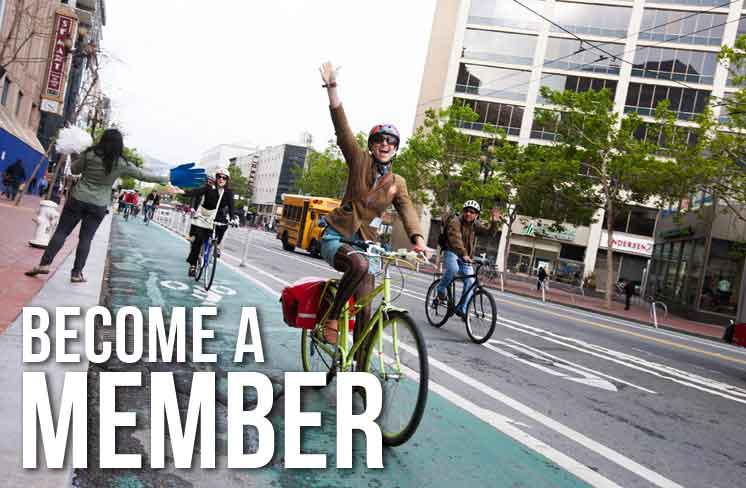In the last year alone, 12 people have been hit and killed on San Francisco streets — nine people while walking and three while biking. Despite this staggering number of tragedies, there is a clear lack of urgency from the City on making our streets safer for people biking and walking.
In most of these cases, the drivers involved in these fatal crashes were not charged or cited, and main biking and walking corridors are still unsafe — with no protection between vulnerable street users and high-speed traffic.
And new evidence has come to light that even the investigations into these fatal crashes may not have been fair or thorough.
The San Francisco Bicycle Coalition has discovered evidence that the SF Police Department may not have fully and fairly investigated last week’s fatal crash, where 24-year-old Amelie Le Moullac was hit and killed while biking to work.
The SFPD had claimed that they asked nearby businesses for video footage, and found none. We now know that is not true.
At the end of our street-side safety event on Wednesday, SF Bicycle Coalition’s Program Manager, Marc Caswell, discovered that there was, in fact, video footage of the crash.
How did Caswell find this footage? He simply walked into a few businesses near Folsom & 6th Streets and asked. Every business that Caswell approached said that the police had not asked them about cameras in this case.
A business at the corner of Folsom & 6th, the site of the crash, had surveillance cameras visible on the outside of the building. The employee said he would review the tapes to see if the crash was caught on film. He called us later that day to say the crash was, in fact, captured on tape.
According to the employee, surveillance footage from the shop is automatically recorded over every seven days. If SF Bicycle Coalition staff had not discovered this footage on that day, it would have likely been deleted before the next morning, and important evidence of Le Moullac’s death may not have come to light.
SF Bicycle Coalition staff called Supervisor Jane Kim’s office, which has been in close contact with the investigating officers. Kim’s office alerted the police to the existence of the footage. Both the police and the lawyers for Le Moullac’s family now have the video. The SF Bicycle Coalition has not seen the footage, nor have we ever had the video in our possession.
We are deeply troubled by the discovery that the police have not fully investigated this crash. And we are concerned about the questions that this raises about previous crashes where people biking or walking were injured or killed.
This is not the only troubling action on the part of the police regarding this tragic crash. During the SF Bicycle Coalition’s peaceful on-street safety outreach, SFPD Sergeant Ernst went out of his way to deliberately block the bike lane with his vehicle, forcing dozens of people on bike into fast-moving rush-hour traffic and endangering the lives of these riders.
Sergeant Ernst repeatedly and publicly blamed the victim in this Folsom Street crash, audible enough for Le Moullac’s friends and loved ones to hear. Sergeant Ernst said he was there to “be an example” to bike riders and that he was creating “exactly the same situation” as the one where Le Moullac was killed. The San Francisco Bicycle Coalition has filed a formal complaint against this Sergeant for his blatant disregard of bicyclists’ safety and for creating an unnecessary and hazardous situation.
It is shocking that a Sergeant took the time to verbally harass and physically endanger people at the site where a woman was just killed; yet the SFPD could not take the time for a thorough investigation, and nearly missed critical evidence that was steps away from the site. As San Francisco Bicycle Coalition Executive Director, Leah Shahum, told the Chronicle, “We are not asking for any special treatment, we just want the police to do their job.”
As advocates for safe streets, we will continue our work to make SoMa streets safer, and help prevent further tragedies from happening. We are working to ensure implementation of the City’s long-overdue redesign of Folsom Street with separated bikeways, as well as push the City to require training for operators of large trucks on how to share the streets with people biking and walking. Despite many advances in making SF a better, safer place to bike, it’s clear our work is far from over.



